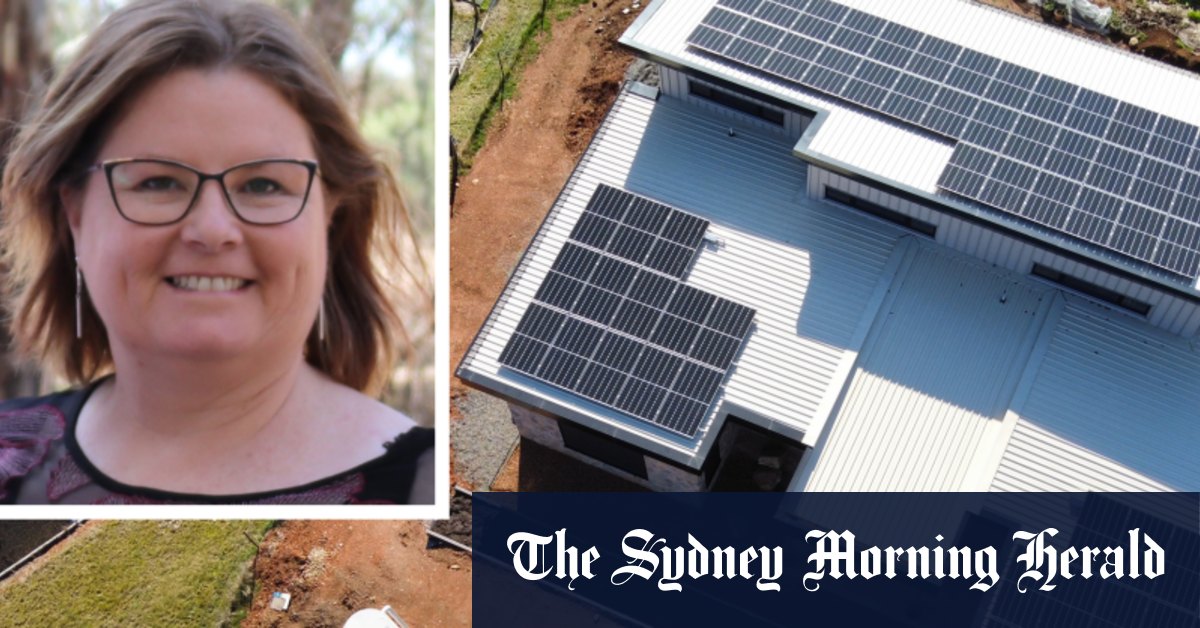The solar industry is in urgent crisis talks after sales of household batteries tanked across NSW because customers are waiting until November when the state government incentive is due to start.
Battery installers want the incentive scheme, which will subsidise the price of a household battery by up to $2400 from November 1, brought forward. The NSW government argues a five-month lead time is needed to ensure the scheme is safe and effective.

Director at regional retailer Solar Integrity Bobbi McKibbin says people have stopped ordering battery systems.Credit: Solar Integrity
More than 100 small business owners joined a conference call last week to discuss the issue, hosted by the Smart Energy Council.
Participant Bobbi McKibbin, director at regional retailer Solar Integrity, warned that the industry was in danger because of the government’s start date for the incentive.
“The industry wants to work with the government on their program,” McKibbin said. “As it stands, sales of batteries in NSW will absolutely grind to a halt.”
Last month, Environment and Energy Minister Penny Sharpe announced a scheme to help households buy batteries to store the solar energy they produce.
When the scheme kicks in, the state government will pay incentives based on battery size, from 2 to 28 kilowatt-hours capacity, consistent with other states. It will also pay a reward of up to $400 to connect to a virtual power grid, which allows energy to be pooled and shared.
McKibbin’s business is in Wodonga, and she sells batteries on both sides of the NSW–Victoria border. Her NSW customers are delaying their planned purchases to wait for the payment, and she expects many customers will also defer their solar installations to gain savings from installing panels and a battery together.
Lily Pejkic, director and chief executive of retailer Sydney Solar, said the long lead time was an “absolute nightmare” for her business.
“Pretty much the next day, we were getting emails to say, ‘thanks for providing the quote, I think we’re going to wait until the rebate comes out’,” Pejkic said.
Pejkic said households were already delaying big-ticket purchases like solar panels and household batteries because of interest rate rises. The recent news that Ausgrid (and other distributors) would be clipping the ticket on feed-in tariffs was another blow because many consumers mistakenly thought they would be out of pocket.
Jeff Sykes, chief executive of comparison site Solar Choice, said at least 10 clients called within 24 hours after the policy was announced to cancel their lead generation contracts.
“People aren’t really interested in buying a battery now when they could wait five or six months and save up to two and a half grand,” Sykes said. “I can’t blame them – I would do exactly the same if I were in their shoes.”
The incentives for household batteries, which typically cost from $9000 to $15,000, are part of the government’s peak demand reduction scheme.
A spokesperson for the NSW Department of Climate Change, Energy, the Environment and Water said a 3–6 month lead time was standard to allow both the scheme administrator and accredited providers time to update their systems.
“In this case, with the rise in community concern around battery fires and safety risk, a buffer was built into the rule to give time for compliance and inspection requirements to be formulated and implemented,” the spokesperson said.
“Safety is a paramount consideration for the scheme, and that is why we need to ensure that we have time to get the settings right.”
This included ensuring that tradespeople were installing batteries to the required standards and that the products themselves met tough warranty and capacity requirements.
SunWiz figures suggest 952,000 NSW households had rooftop solar at the end of 2023, while just 70,299 also owned a battery. The scheme should drive significant uptake of batteries, and was “strongly endorsed” by Rewiring Australia and welcomed by the Clean Energy Council as “a major step forward”.
Home batteries help match electricity supply to demand on the grid because they enable households with solar panels to store the electricity they generate in the middle of the day to use or sell back to the grid during the evening peak.
Flattening out demand is known in the industry as “squashing the duck” because of the way the peaks and troughs in electricity demand throughout the day resemble the shape of a duck.

